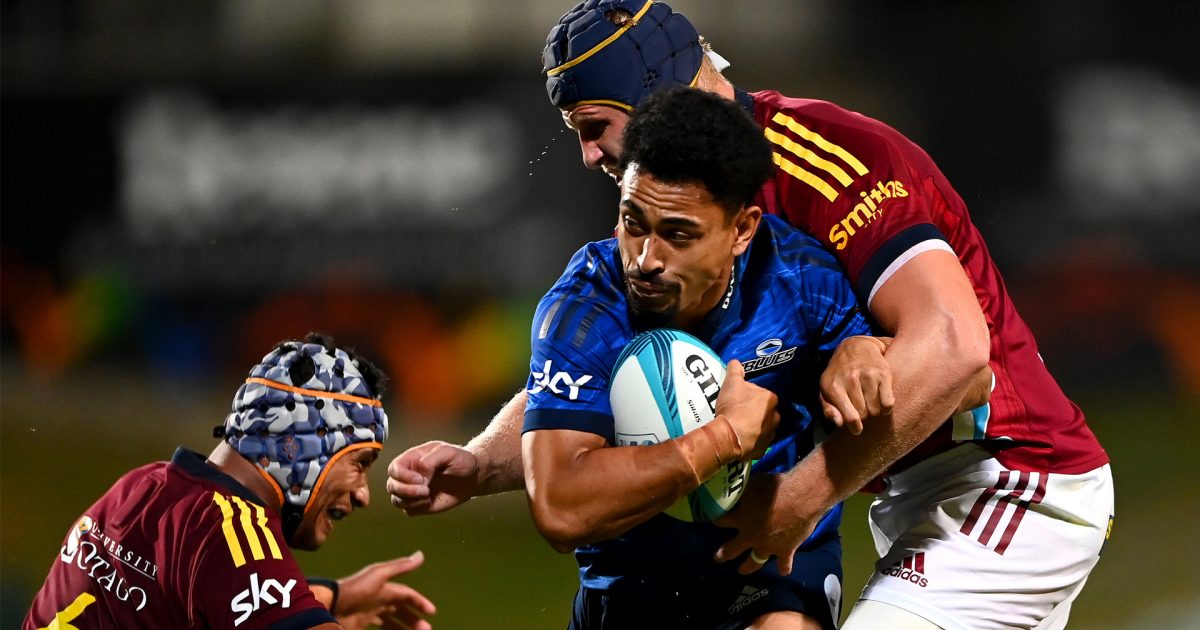'It sneaks in pretty quickly': Covid behind Blues' early-game inaccuracies

While the Blues managed to secure a 32-20 win over the Highlanders at North Harbour Stadium on Friday night, it was far from a vintage performance for the Super Rugby Trans-Tasman champions.
Down 13-3 at halftime, it took some excellent work in the second spell from the likes of flanker Taine Plumtree and wing Mark Telea, plus an improved showing from the forwards as a whole, for the Blues to flex their muscles over a Highlanders side that now sits on four losses from four matches played in 2022.
The Blues were incohesive and inaccurate throughout the first 40 minutes, dropping passes, kicking away possession and ultimately struggling to build any pressure on their opposition. Some of those inaccuracies, however, can likely be attributed to the late changes made by the Blues due to the emergence of Covid within the squad.
All Blacks Nepo Laualala and Beauden Barrett were both initially named to start on Friday night but were withdrawn ahead of kick-off. That saw Marcel Renata promoted from the bench into the No 3 jersey while fullback Stephen Perofeta moved into Barrett’s vacated spot at first five and Zarn Sullivan joined the run on side in Perofeta’s place at the back.
While there were aspects of his side’s performance that left Blues coach Leon MacDonald frustrated throughout the first half, he acknowledged that the late changes to the team may have been behind the Blues’ lack of cohesion early in the piece.
View this post on Instagram
“I think it had a part to play,” MacDonald said following the match. “We were shuffling the team around, the guys hadn’t really trained in those positions. Stevie had no time at first five this week and Zarn had limited time at fullback et cetera.
“Those things, they don’t help, but we have been training together as a squad now [for a while] and we’ve been talking about that this will happen, we’ve been expecting this to happen [but without the changes we] might be clicking a bit earlier than what we did.”
With Covid rampant in New Zealand at present, the Super Rugby sides have been well versed in minimising the impact of the pandemic but, as the Blues’ situation in the build-up to Frida has reinforced, it’s impossible to prevent emergences altogether.
“You can’t fully protect yourself,” he said. “We have guys going home to their houses with their partners who work, or flatmates who work. So you can only do as much as we can and when we’re in our environment we’ve got control but once you go home, we haven’t.
“It sneaks in pretty quickly and when it does, it takes off through the environment pretty quickly. It’s a bit of an awakening for us really.”
Despite the early-game hiccups, the Blues roared into life immediately after the halftime break with 22-year-old Plumtree scoring two tries in the first 10 minutes of the second stanza after some good work in the tight by the Blues’ pack and from that point on, the home side were in control of the match.
Having scored wins in their past two matches at home, the Blues will now take to the road for fixtures against the Crusaders and Highlanders in the South Island. That first game, in particular, will be a massive challenge for the Blues who could still be without some of their top players due to Covid – although MacDonald is hopeful that all the positive cases have already been identified in camp.
“Obviously they need to recover and come back after their stand-down period,” he said. “Hopefully we’ve ring-fenced it and hopefully that’ll be it.”
Having already lost Harry Plummer for the season, Barrett’s unavailability would strip the Blues of their two first-choice flyhalves. It would also rob the fans of the chance to see New Zealand’s two premier pivots face off in what’s sure to be an enthralling contest at Orangetheory Stadium next Sunday.
As Highlanders coach Tony Brown said earlier in the week, it appears that whichever team remains the healthiest will have the best shot at taking home the spoils this season.





































































